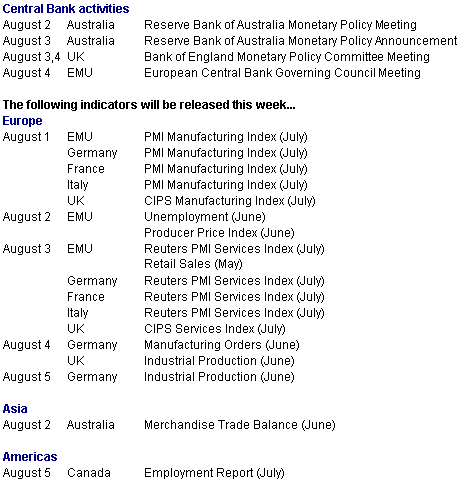Monday, August 1, 2005

Global Markets
World equity markets had a broadly positive month as the relentless flow of quarterly earnings reports continued to please investors. Investor optimism also reflects many of the improving sentiment indicators beginning to emerge from July. Second quarter Tankan, which was released at the beginning of the month, got Japanese indexes off to a positive start. Subsequent economic data for industrial production, unemployment and retail sales bolstered the positive view. In Europe, the weakening euro has helped sentiment there, with the German ZEW and Ifo surveys turning in positive gains and translating to a more positive EU/EMU economic sentiment index. Declining unemployment in both France and Germany also helped. And the stream of good news on the U.S. economy continued unabated as well, which is always good news for exporters abroad! On the month, all 13 indexes tracked here gained, but the Dow continues to languish below its year-end level.
Comments spewed forth concerning the potential ramifications of Beijing's move last week to a managed float of the renminbi (yuan). Analysts immediately began projecting this as the first of several future moves in the relatively near future. This was forcibly denied by the People's Bank of China, which said it would not revalue the yuan again in the "foreseeable future." The PBOC sought to damp predictions that the 2.1 percent appreciation on July 21st is the first in a series of changes with increasing vigor.
Global Stock Market Recap

Europe and Britain
Both the CAC and DAX had a banner July and continued to hit new three-year highs. The CAC was up 5.3 percent while the DAX jumped 6.6 percent on the month. Healthy earnings by some auto makers and energy companies buoyed equities. The lower value of the euro has lifted the spirits as well. The economy is beginning to show signs of life as exporters benefit from the weaker currency. Last week, the DAX rallied after it was announced that Jürgen E. Schrempp would step down as chief executive of DaimlerChrysler. On Friday, equities pared gains from earlier in the session as investors were disappointed with second quarter U.S. gross domestic product data that showed annualized growth of 3.4 percent. Crude prices surged above $60 a barrel following a second refinery fire in Texas in the past month.

It was a difficult month in Britain. But despite the terrorist attacks, the FTSE bounced back from the sharp drop immediately after the first deadly attack and never looked back. While the index lagged the CAC and DAX, it did manage to gain 3.3 percent on the month.
Asia/Pacific
The star performance was turned in by the South Korean Kospi in July. The index registered a fresh 10-year high after the release of strong domestic economic data. It was the Kospi's first advance above 1,100 since 1994. The index was up over 10 percent in July.
Japan typically releases a slew of economic data in the last week of the month, and Thursday night (U.S. eastern time) was no exception. Despite the mixed picture that emerged from the data - industrial production up but the consumer price index and worker household spending down - the Nikkei hit a four-month closing high, helped by positive second quarter earnings reports.

The Bank of Japan held a one-day meeting last week and left monetary policy unchanged. At a press conference after the meeting, Bank Governor Toshihiko Fukui said there was a possibility that core consumer prices (which exclude fresh food) might rise year-on-year from late this year to early next year. The BoJ is committed to leaving intact its ultra-loose monetary policy, specifically zero interest rates, until the core consumer price index moves sustainably into positive territory. The governor reiterated that the bank was in no hurry to tighten policy - they want to make sure the economy never falls back into deflation again. The gradual easing of deflation is being helped by technical factors. The effect of sharp drops in telephone, energy and rice prices all included in core CPI will drop out of the numbers over the next few months. And higher oil and gasoline prices are eroding underlying deflation faster than expected.
The governor also said that while the central bank is making utmost efforts to keep pumping huge amounts of money into markets, weak demand for funds may eventually result in a decline in its liquidity provision. Fukui's remarks came as the central bank finds it difficult to have banks hold on to extra emergency cash as the economy recovers, so that the BoJ can keep its account balance target between ¥30 trillion and ¥35 trillion ($267 billion and $312 billion). In May, it opted to allow temporary drops below the lower end of the target. But speculation has emerged recently that the central bank may have to do more, as deeper and more prolonged breaches of the target could occur.
Currencies
The yen was the focus for global currency investors in the aftermath of China's renminbi revaluation. The yen jumped on the news but immediately returned to its previous level after it became clearer that the extent of the Chinese move was less than some had hoped. The yen rose sharply on June 21st when Beijing surprised the markets by revaluing the renminbi by 2.1 percent to Rmb8.11 to the U.S. dollar and initiated a new managed float under which the currency, in theory, should be able to gradually firm still further. It allows a daily move of 0.3 percent against the dollar on either side of the rate.
In response to market (and political) pressures, the PBOC said that it has no plans to allow a sharp increase in the currency's value, noting the 2 percent increase was part of exchange-rate reform and not a prelude to more increases as some observers have speculated. The bank denied what it described as mistaken news reports that the move to break the currency's link to the U.S. dollar could lead to a stronger yuan. "Gradualism is one of the important principles in the yuan exchange-rate-mechanism reform," the bank said. "Gradualism is aimed at the gradual reform of the yuan exchange-rate mechanism, not at the gradual adjustment of the level of the yuan exchange rate."

Yet another pressure on the yen is the uncertainty of Prime Minister Junichiro Koizumi's political future. He has threatened to resign and call a snap election if legislation to privatize Japan's postal service is blocked in a vote in the country's upper house. The vote is due in early August. The leader of Koizumi's Liberal Democratic Party in the upper house has said that the bill has only a 50 percent chance of success. The lower house narrowly approved the bill. But should the legislation be passed it would represent a significant step forward for structural reform in Japan.
The yen is also being pressured by portfolio outflows. Data showed that Japanese investors bought a net ¥1,181 billion worth of foreign bonds in the week to July 15th, swamping the ¥127 billion of net inflows into Japan's stock market from overseas investors.
Indicator scoreboard
EMU - June M3 money supply was up 0.9 percent and 7.5 percent when compared with last year. For the three months ending in June, M3 was up 7.2 percent when compared with the same three months a year ago. The moving average is the measure preferred by the ECB. June's reading is far above the Bank's target growth rate of 4.5 percent.

July economic sentiment climbed to 97.3 from 96.3 in June. Industrial sentiment improved to minus 8 from June's minus 10. Consumer sentiment remained unchanged at minus 15. Industrial components including assessment of order books and stocks of finished products improved while production expectations were stable. Services sector confidence improved to plus 11 from plus 9 in June thanks to a more positive view of the current business situation and demand. Retail sentiment, however, slipped to minus 10 from minus 9 in June.

July flash harmonized index of consumer prices was up 2.2 percent when compared with the same month a year ago. The HICP was up 2.1 percent in June. As with all flash reports, no detail was provided. The index continues to be above the ECB's 2 percent inflation ceiling.

Germany - July Ifo business sentiment index climbed to 95 from June's reading of 93.9. Future expectations rose to 95 from 92.9 while current conditions rose to 94.9 from 93.7 in June. Sentiment increases were up for manufacturing, wholesale and construction while retail declined.

June seasonally adjusted unemployment was down by 20,000 jobs. July unemployment rate edged down to 11.6 percent from 11.7 percent in June. The unemployment rate was down to 9.7 percent in the west from 9.8 percent in May. In the east, the unemployment rate was down to 18.7 percent from 18.9 in May. June employment was unchanged.

June total retail sales were down 0.8 percent and 0.2 percent when compared with last year. Excluding autos and gasoline stations, retail sales were down 0.3 percent but up 0.5 percent on the year. While sales for clothing, shoes and leather goods jumped 5.6 percent on the month, food, drink and tobacco sales were down 0.4 percent and home furnishings sales inched up 0.1 percent.

France - June producer price index was up 0.4 percent and 2.9 percent when compared with last year. Excluding food and energy the PPI was down 0.2 percent and up 1.9 percent on the year. Energy prices continue to play a dominant role in putting upward pressure on the PPI.

June seasonally adjusted International Labour Organization unemployment rate edged down to 10.1 percent from 10.2 percent in May. The number of unemployed declined by 28,000. The ILO definition of unemployment excludes jobseekers who did any work during the month.

Italy - June producer price index was up 0.6 percent and 3.7 percent when compared with last year. The index was pushed higher by energy along with capital and consumer goods prices. Excluding energy, the PPI was down 0.1 percent and up 1.4 percent on the year.

Britain - July Nationwide house price index was up 0.2 percent and 2.6 percent when compared with last year. The annual increase was the lowest since May 1996. The average house price is Stg158,348 compared with Stg157,791 in June. The survey provides further proof that the house market is stabilizing.

Asia
Japan - July Tokyo consumer price index was down 0.1 percent and dropped 0.3 percent when compared with last year. Tokyo core CPI was down 0.1 percent and declined 0.4 percent on the year. June national CPI sank by 0.5 percent and dropped 0.5 percent on the year. Core CPI was down 0.1 percent and down 0.2 percent on the year.

June industrial production was up 1.5 percent and 0.1 percent when compared with last year. The rebound was led by electronics parts, electrical machinery and other manufacturing.
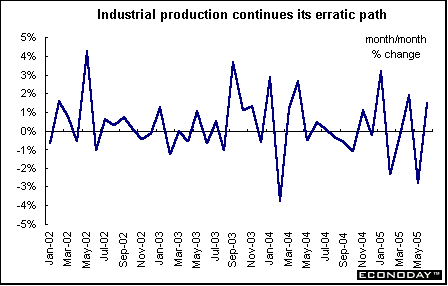
June seasonally adjusted wage earner household spending dropped 1.4 percent and was up 0.7 percent when compared with last year.
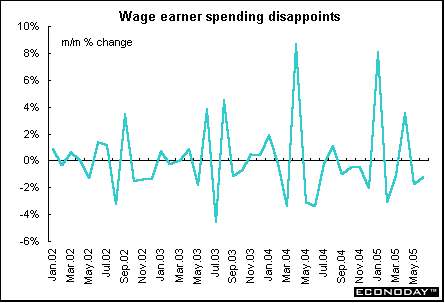
June unemployment rate dropped to 4.2 percent from 4.4 percent in May. This is the lowest level since July 1998. The labor force participation rate was 60.9 percent. The drop in the unemployment rate was largely due to a decline of 510,000 in the labor force.
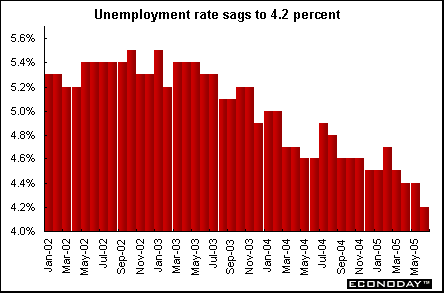
Australia - Second quarter producer price index was up 0.8 percent and 3.4 percent when compared with the same quarter a year ago. The domestic component was up 1 percent mainly due to increases in building construction and petroleum refining. These increases were partially offset by drops in meat and meat product manufacturing, and motor vehicles and parts.
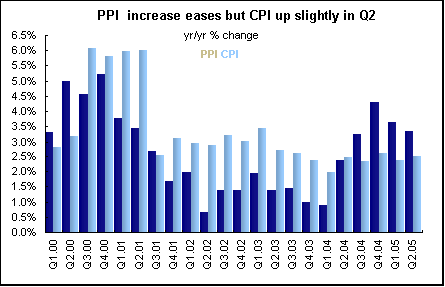
Second quarter consumer price index was up 0.6 percent and 2.5 percent when compared with the same quarter a year ago. Second quarter CPI for market goods and services was up 0.2 percent and 1.8 percent on the year. This measure excludes certain volatile items such as fuel, fruit and vegetables, utilities, property rates, health, education and child care. It is viewed as a measure of underlying inflation.
Americas
Canada - June industrial product price index (IPPI) was unchanged and up 0.2 percent when compared with last year. Higher prices for petroleum products, fruit, vegetable and feed products, lumber and other wood products and chemical products were offset by lower prices for motor vehicles and other transport equipment, meat, fish and dairy products, primary metal products, pulp and paper products and electrical and communication products.
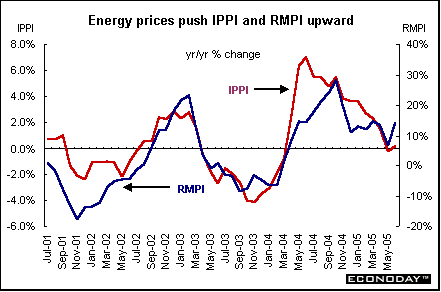
June raw materials price index (RMPI) was up 5.4 percent and 13.9 percent when compared with the same month a year ago. Prices increased for mineral fuels, non-ferrous metals as well as vegetable products. Mineral fuels were up 10.8 percent on the month as crude oil prices soared by 13.0 percent due to concerns about supply disruptions and production capacity.
In June, the value of the Canadian dollar rose 1.2 percent against the U.S. dollar. As a result, if the impact of the exchange rate had been excluded, the IPPI would have increased 0.3 percent instead of remaining unchanged from May. On the year, the value of the Canadian dollar rose 9.5 percent against the U.S. dollar. If the impact of the exchange rate had been excluded, producer prices would have risen 2.6 percent rather than their actual 0.2 percent increase.
May monthly gross domestic product was up 0.3 percent and 2.9 percent when compared with last year. Industrial production, which combines factory, mines and utilities output, was up 0.6 percent. Construction activity was flat while retailing dropped thanks to sinking new auto sales.
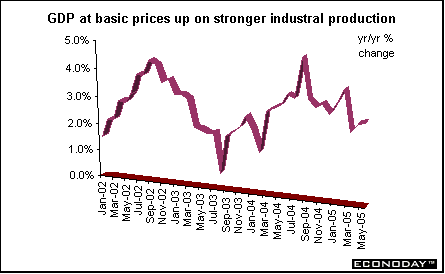
Bottom line
The pace of new economic data releases picked up at the end of last week and will be followed by a heavy dose of new information this week. In addition, our monthly cycle of central bank meetings begins with the Reserve Bank of Australia's announcement on Tuesday night (U.S. daylight savings time) followed on Thursday by the Bank of England and the European Central Bank meetings and announcements. The Bank of England is widely expected to drop their policy rate by 25 basis points to 4.5 percent.
Looking Ahead: August 1 through August 5, 2005
